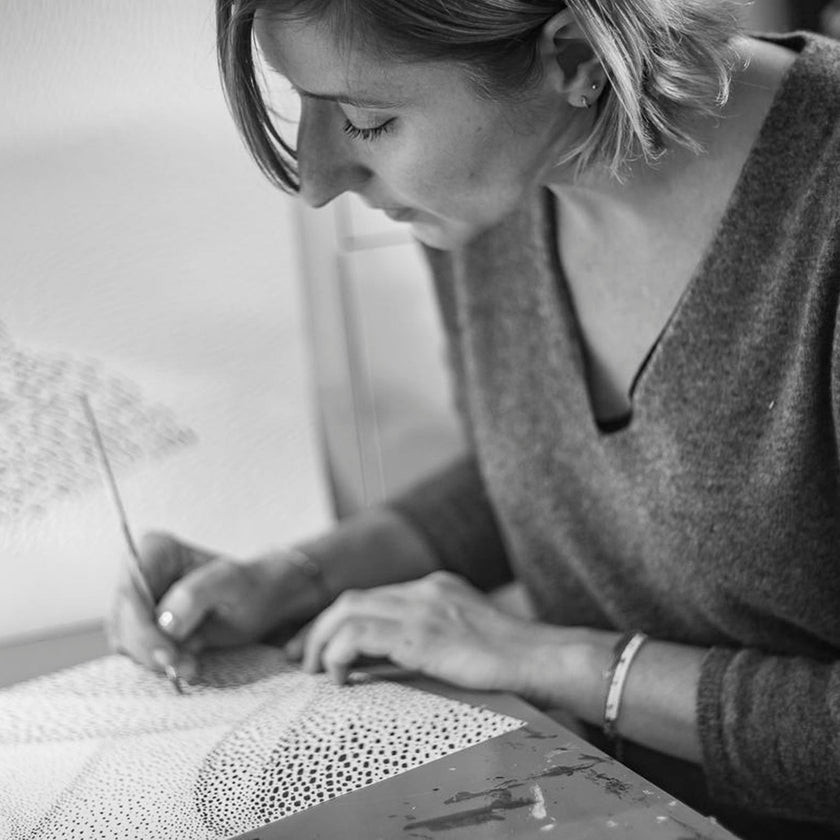ALIX WALINE

Alix Waline (b. 1982) is a French artist of international acclaim. After studying at the Ecole des Beaux-Arts in Paris and the National School of Visual Arts La Cambre in Brussels, she devoted herself entirely to drawing, exploring the possibilities of a wide range of artistic mediums and formats.
Alix Waline's portfolio includes joint projects with the house of Cartier, the French brand Diptyque, the interior design house Pouenat, the Pinton manufacture and the architectural bureau Gilles & Boissier.
In her work, Alix Waline seems to "appropriate" space, expanding its boundaries. Her approach to drawing is to work with a living organism, developing according to its own laws. The abstract forms she creates come to life on the surface, questioning the boundary between the external and the internal.
"I do not strive to create an image - I strive to capture the energy flows that pass through all living things, to show the invisible reality, from the infinitely large to the infinitely small. Drawing attracts me with its technical simplicity. I use the most basic tools: black markers of three diameters, ink and pencils. Using the pointillism technique, I create a three-dimensional image with a strong optical vibration. I work with the drawing as with a material. Through a graphic grid, I create an image by placing dots in a certain rhythm that form the fabric of the surface. The drawing spreads dot by dot, layer by layer, until it takes over the entire surface. I use markers until my last "breath" - in an attempt to capture the very essence of the movement of life and remind the viewer of human nature. At a body-sized scale, both artist and viewer are forced to come face to face with a nature greater than ourselves – something we cannot fully control,” says Alix.
The artist strives to erase the traditional boundaries between the plastic and decorative arts. She perceives drawing not only as an independent form, but also as a "raw material" - a substance embodied in textiles, ceramics, architectural surfaces. Rejecting the opposition of function and aesthetics, Alix Waline offers a new reading of art as a process of transformation, where the work is not only contemplated, but also lived.
«In this series, I approach drawing as an act of care and transmutation. The gesture — both repetitive and meditative — recalls that of a fire-cutting healer who diverts the burn, allowing the body to reclaim its breath.
I work with simple tools: black markers of varying thicknesses, ink and pencils to create a vibrating field in which the surface becomes a space of energy in transformation. Ink, unpredictable by nature, spreads and seeps into the material, while the marker, more accurate and precise, denotes and structures. The emerging forms — organic, fragmented, sometimes almost cosmic — reveal a process that oscillates between eruption and restraint. The surface becomes a place of passage, where energy circulates, shifts and comes to rest».
Couper Le Feu unfolds as an organic, experimental practice in which drawing becomes a way of listening to the living, a fragile balance between gesture, matter and vibration. Like any living organism, the work remains in a state of constant instability, challenging our modes of perception with an assumed strangeness.. Both artist and viewer confront nature that surpasses us and over which we have little control.






























































A distinct direction in Alix Wallin’s practice is the creation of in situ works — pieces conceived in close contextual and emotional dialogue with the specific location she is invited to engage with. Graphic panels are created directly on the walls of a space, rather than produced in the studio, transforming the entire environment into a single, unified work of art.
Among these projects are her collaborations with the architecture studio Gilles & Boissier, for which she created works for the interiors of the restaurant Kinugawa and The Chess Hotel; murals for the Moncler boutique in Seoul; projects for the Renaissance Bordeaux Hotel and Mandarin Oriental Paris; commissions for private residences; as well as collaborations with brands such as Cartier, Diptyque and Pinton.
Each of these works embodies her creative method: a symbolic expression of vibration, flow and movement. The delicacy of her drawing arises from precise, deliberate gestures and an intentionally restrained palette of techniques — the artist works exclusively with black markers of varying diameters, ink and graphite pencils.
“I am not striving to depict; I seek to capture the currents and energies that course through all living things, to reveal an invisible reality that spans from the infinitely large to the infinitely small. By creating a graphic network of interlacing lines, I construct the drawing like a textile: the dots fall into rhythm, giving the surface a sense of physicality and depth. My work is centred on the study of texture and aims at synaesthesia — the unity of visual and tactile perception,” she explains.









































































































